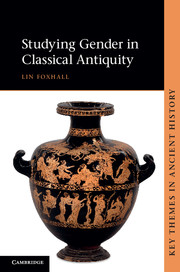Book contents
Chapter 3 - Demography
Published online by Cambridge University Press: 05 May 2013
Summary
The previous chapter explored the structure of families and households as institutions. This chapter will focus on a selection of the temporal and demographic processes that shaped and changed them and their members, while transmitting and reproducing gendered values, hierarchies and structures.
FAMILY ‘LIFE CYCLES’ AND ‘LIFE COURSES’
For ancient Greece we know more about the ideals than the realities of family life cycles, although there have been some attempts to reconstruct ‘typical’ ones (Gallant 1991: 27–30), based largely on Athenian evidence. It seems that family ‘life cycles’ and virilocal residence patterns (where women move to live with their husband or husband’s family) favoured the male line and agnatic connections for the most part, even though kinship was bilateral. On marriage (see Chapter 2), men effectively remained in the oikos into which they had been born, while women moved to a new one but retained their identity with and attachment to their natal household. Women therefore lived out their lives in two (or more) households, men in one.
For the Roman world, there are more hard data available but the most complete data sets, from Egypt (Bagnall and Frier 1994: 57–74), reveal patterns that may not be typical of the wider Roman world, within which there was probably considerable local diversity. The most striking feature of the households represented in these census returns is the wide morphological variation within even a single community. It is clear that in many cases the ‘nuclear family’ is likely to be an accident of survival; most of the numerous instances consist of older couples with children, suggesting that young couples on marriage generally moved in with parents, usually the groom’s parents, but became ‘nuclear families’ when the older generation died (Bagnall and Frier 1994: 61). A significant number of households consisted of co-resident adult brothers with their families. Large, complex households seem to have been significantly more common in villages than in the urban areas. Many but not all households had slaves (more in the town), mostly domestic servants, and more female than male.
- Type
- Chapter
- Information
- Studying Gender in Classical Antiquity , pp. 45 - 67Publisher: Cambridge University PressPrint publication year: 2013

